The first time Dory Gannes was jumped, she stepped over an irrigation ditch and onto two acres of land she thought she owned. She looked as out of place as you'd expect from a white, twenty-something in pink Crocs and a University of Michigan pullover in the middle of a forgotten village in Tanzania. But something about her belonged.
All Gannes had to show for the last two years stood in front of her. Piles of cinder blocks. A concrete slab spouting weeds. The half-finished skeleton of a building she hoped to transform into an orphanage.
Withered fields of corn rustled by the breeze and banana plants so thick they blocked sunlight surrounded the land. They hid the old man brandishing a club so well that he seemed to appear from nowhere.
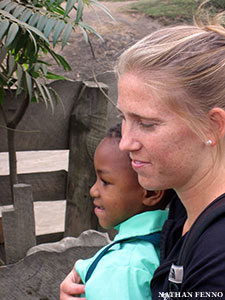
The man's body shook beneath a tattered blue sport coat. Neck veins bulged as he screamed in Swahili. He stood inches from Gannes, close enough for her to see the wild eyes that made her certain he had every intention of using the hunk of wood in his right hand.
Gannes froze.
A few days earlier, she'd told a visitor they were crazy to be here.
"But I already know I'm crazy," she said, without a trace of irony.
Already Gannes had been lied to, ripped off, threatened, followed and frustrated at each turn in her quest to build an orphanage in the Olevolos village. What started as building a few chicken coops spiraled into a project so personal that if it failed, Gannes felt like she failed.
At the University of Michigan, Gannes hadn't been the soccer team's most talented goalkeeper. But she could ace the fitness tests. That got her on the team as a walk-on in 2003 and helped her earn a letter a year later. Before testing one year, she was so determined to be hydrated that she made herself sick from drinking too much water. Focus on what she could control and cling to it. Ignore everything else.
But she wasn't just a one-time college athlete. She was an Ohio schoolteacher devoting any spare time to building the school in East Africa. And, now, she couldn't believe the club-waving man telling her to get off the land that papers in her backpack proved she owned.
Gannes stayed calm. A fight meant failure. For the project. For her. The club-waving man lunged toward her. Suddenly, a man built like a fire hydrant stepped in between, only to have his left arm slapped down by the club. James Obanda, the only person Gannes trusted in Africa, wanted to be president of Tanzania. For now, he was her fixer, translator, bodyguard and part-time father to village children without one.
Obanda tried to summon the village chief on his cell phone. The club-waving man swatted the phone away. He claimed to be a police officer, telling Gannes and Obanda they were under arrest.
The commotion drew a farmer working a nearby corn field. Hoe in hand, he chased the club-waving man into the banana plants. Gannes and Obanda exited down a path, as wide-eyed children ran behind, bare feet kicking up puffs of dust and shouting, "Dory! Dory! Dory!"
The pile of cinder blocks and concrete remained, a scar cutting through the elephant grass and purple flowers.
HELPING CHILDREN in Tanzania would be simple. That long-ago expectation seemed absurd as Gannes sat at regional police headquarters in Arusha, a half-hour from the village by rattling minibus. The northern Tanzanian town is better known as the jumping-off point for expeditions up Mount Kilimanjaro. An officer in civilian clothes dragged a man into the building, stopping every few steps to punch him. Inside, the calendar on the peeling wall declared the "Year of Sanitation."
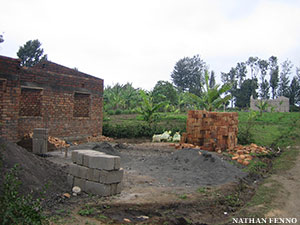
"This is pretty weird," Gannes deadpanned.
Weirder still were the scraps of paper she cradled. Scrawled in pen on what passed for official documents were arrest warrants for her one-time allies, Jane and James Sanare. Gannes was having them charged with assault, theft and fraud. Repeating their names made Gannes look like she wanted to spit. Everything had gone to hell, though Gannes' distaste for profanity prevented her from saying so.
The Sanares had allegedly hired the club-waving man to keep Gannes and Obanda off the two acres, according to Olevolos village officials. Visitors were told the Sanares owned the land, that the construction was for their new orphan's center. Twenty-four hours later, James Sanare spotted Obanda and Gannes in front of Mount Meru Hospital in Arusha. Screaming, he grabbed Obanda and shook him. Thirty or 40 people circled around. None intervened. A furious Gannes threw herself between the two to prevent a fight. Bystanders finally dragged away James Sanare.
The path to police headquarters started 14 years earlier when an eight-year-old Gannes and her mother traveled to Kenya on a 12-day safari, part of a globetrotting childhood stretching from Turkey to Bali. But the faces of Kenyan children burned into her mind. Those faces pulled her back to Africa in 2006, teaching English in Tanzania, then building chicken coops. One coop held 80 chickens and sat in front of Jane Sanare's orphans' center in Olevolos.
Chickens couldn't change the future of the 17 million Tanzanians -- 38 percent of the population -- struggling in poverty. Sure, Tanzania escaped the tumult of headline-grabbing neighbors such as Rwanda, the Democratic Republic of the Congo and Burundi. But East Africa's decades-long unrest pushed a half-million refugees into Tanzania, Africa's highest concentration. More stress for a country that needs $2 billion in foreign aid each year. Most of the impoverished live in rural areas that included Olevolos, relying on subsistence agriculture.
Maybe an orphanage could help, Gannes thought.
By 2007, Gannes was the executive director of a full-fledged charity, The Olevolos Project, while finishing up her English degree and playing soccer at the Michigan. Donors organized bar nights, garage sales, skate nights, school dances, donated birthday money, sold soda, lemonade and home-grown vegetables. They were high schoolers, 10-year-olds, grandparents, college students. Donations topped $100,000.
Nothing else went according to plan. The first piece of land Gannes bought for the orphanage wasn't big enough. So she purchased the two-acre plot and scaled back the project to house 25 orphans instead of 250. There weren't as many orphans in Olevolos as she anticipated. An informal study by two of Gannes' volunteers suggested that Jane Sanare had dramatically overestimated the orphan population. In response, Sanare emailed Gannes that she was "perplexed" and wondered "why they can be so evil and what are they up to." Still, Gannes hired a contractor, drew up blueprints and decided to paint the buildings blue and yellow, the colors of the Michigan Wolverines.
When Gannes learned she couldn't own land in Tanzania because her organization wasn't registered there, Sanare offered to help. Almost 20 million Tanzanian shillings -- over $12,000 -- were wired to Sanare to help pay for the two acres. Sanare was instructed to register the land under "The Olevolos Project." Instead, according to Gannes' allegations, she registered the land under "Jane Olevolos." Then, unknown to Gannes, Sanare sold the smaller plot of land, according to local attorneys, village officials and others familiar with the transaction.
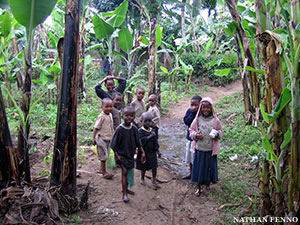
Deadlines to finish construction came and went. Same for Jane Sanare's emailed promises to change the name on the land deed, Gannes said. Construction was finally halted. The project sank into a quagmire of lawyers, village politicians, and, now in the summer of 2008, the police.
The warrants Gannes clutched as she returned to the outskirts of Olevolos cut through her frustration. They felt like the first good thing, the first real progress in the last year.
Four police officers sprawled on red plastic chairs bearing Coca-Cola logos and swatted flies with swagger sticks. Scrawny cows shared space with minibuses where passengers hung out the doors.
In a nearby alley, Gannes grinned and posed for pictures with the warrants before handing them to the officers.
The officers borrowed a dilapidated Peugeot to collect the Sanares, having to push the car before it started and lurched away in a cloud of dust and exhaust turned orange by the setting sun.
FOR ONCE, the road was free of the choking haze of sawdust, exhaust and dust stirred up by logging trucks. Down the road, near a lumberyard, Gannes spotted a child. Abigail. The tiny girl always smiled, even on days she could barely keep her eyes open because of hunger.
Every day or two, Gannes poked her head into the cramped, dark room Abigail shared with her three siblings. Their 25-year-old sister raised them, scraping out a few shillings by selling oranges in the village market. Both parents had died.
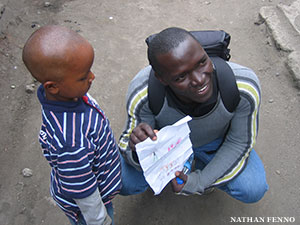
Gannes dropped her backpack -- forget the expensive digital camera and video recorder inside -- sprinted 40 yards, picked up the knee-high girl and swung her around.
Thoughts of the stalled project disappeared. Village children bring Gannes into another dimension. That's where she's most at ease, hopping into soccer games with balls made from wads of plastic bags and tape, teaching kids a few words of English, patching wounds, admiring their sketches in her Moleskin notebook and checking on academic progress or living conditions. The children cling to visitors, craving a hug and a few minutes of attention more than a meal. Circular rashes from ringworm cover many of them. Their smiles demand attention.
The children felt like her family. Poster-size photos of them decorated the walls of her $275 apartment in Ohio. To save money, she ate cereal for dinner, too. All to invest most every free moment and dollar in the project.
Gannes felt as if she lived on two planets. Away from Tanzania, she taught English and coached soccer and lacrosse at the $22,000 per year, girls-only Laurel School in suburban Cleveland. She wanted to bridge these worlds.
Nearby, Rehema Makau lived with her children, Jackson and Happiness, in a room with a hot plate, one bed and a few dirty five-gallon buckets and suitcases piled in a corner. Jackson is one of Gannes' favorites, with boundless energy and uncanny intelligence. He always remembers to say "Please" or "Thank you." Gannes loved that.
As Gannes tugged a yellow polo shirt on Jackson, two neighbor women poked their heads inside to see what was going on.
"Dory, Dory, Dory," said Makau, as she laughed and wiped mud from her son's shoes.
"Ah, dada Dory," one of the women said, using the Swahili word for sister.
This is a world away from the three-story Craftsman house where Gannes grew up in the Professorville neighborhood of Palo Alto, Calif. Gannes surrounded herself with children then, too -- five Cabbage Patch dolls she played mother to in elementary school. By high school, she started her own babysitting business, "Magic Kid Care," between soccer, tennis, rock climbing and skiing. She could control these things. She couldn't control breakdowns inside the home that eventually led to her parents' divorce.
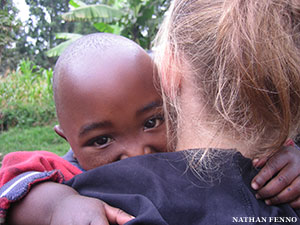
Gannes searched for definition outside her family. Struggles with standardized testing while her oldest sister, Liz, pulled a 1540 on her first try at the Scholastic Aptitude Test, drove Gannes to athletics. That felt natural. Every day she biked to Stanford Stadium -- 85,500 people fit inside back then -- and ran stairs alone. Effort and intensity were easy to control.
Once Gannes sets a goal -- sprinting five miles on a treadmill or building an orphanage -- pushing forward is the only option. Forget the cost. Stubbornness won't let her stop. The finish line is the only thing in her mind. The steps leading there don't matter.
VOICES OF children chanting drifted through the morning's damp air. Dozens of children at Jane's Center prayed for the Sanares' release from jail. The faceless voices sent a shiver down Gannes' back.
Gannes quickened her pace to a special meeting of the Olevolos village council to banish the Sanares. An off-duty police officer trailed her for protection. Small groups of women and children completed the procession, brightly-colored wraps pulled tight against the chill.
"This is like going to a pep rally," Gannes said.
Olevolos sprawls across the foothills of Mount Meru, the country's second-highest peak. No commercial center exists. Just mud-and-dung homes without power or running water, scattered for miles among thick groves of banana trees and fields of sugar cane and corn. Walk all day and one won't cover the entire village. Not even the village chief, William Llalo, knows the exact population. Ten thousand is the best guess. A bewildering maze of pathways connects everything. Gannes navigates them like she was raised here.
The meeting started an hour and a half late in a room without lights and bars on the windows instead of glass. Twenty-four people crammed onto benches.
Village leaders promised this would fix everything. But each lawyer, police officer and village politician told Gannes what she wanted to hear. The pile of cinder blocks sat unimproved.
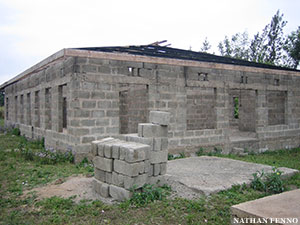
Gannes wasn't prepared for the letter from Jane Sanare's representatives to the council. It claimed two unnamed whites videotaped themselves having sex with village children and it would happen again if whites weren't barred. Gannes seethed, but council members laughed off the claim. The Sanares' letters were a running joke. Their lawyer once gave the chief seven days to flee the village in response to a letter demanding the two acres return to Gannes.
In a community of rail-thin people, Jane Sanare's girth jumped out. So did her black leather jackets and straightened hair. She claimed divine inspiration for the orphans' center she opened in 2005. "You see," she wrote in an April 2008 letter to the English-language Arusha Times: "I have no steady employment for any stable source of income."
A few days earlier, three Western volunteers from Jane's Center discreetly met with Gannes. The trio was frightened Sanare would discover the meeting. "Our red flag was the first time we met (Jane)," one said. "We heard how poor she was and she didn't look like that at all." The volunteers claimed children at the center weren't fed for a two-week stretch, despite ample supplies of porridge. Even volunteers weren't fed regularly, they claimed, despite their organization, Global Crossroad, reimbursing Sanare for meals.
Five months earlier, Sanare defended herself in an e-mail to Gannes, part of a years-long pile of correspondence from Sanare replete with threats, counter-claims, accusations and Bible verses.
"I think that will be a bright ideal to have my (sic) prosecuted, during the process we shall know who is wrong and who is not," Sanare wrote Feb. 8, 2008. "I have all my documents with me and I strongly believe I have done nothing wrong to you to anybody. There are so many rumours spreading around town that we are thieves."
Each of Gannes' words to the village council was forceful and even. But emotion crept in at the mention of orphans. Her voice became a plea.
"I believe Jane should be locked up in prison and not allowed to set foot in this village," Gannes said. "It's quite clear she's using orphans and kids for her own personal benefit."
"Please do not judge our country," the chief said. To explain Sanare's behavior, he pointed out she is Kenyan, not Tanzanian. "God will judge her."

Each witness stoked the council's anger, as accusations flew from four women and three children who testified. One woman on the council pounded her knees. Another buried her head in her hands and rocked back and forth. Disapproving heads shook as if they were on swivels.
"Deny (Jane) being in the village, deny her presence," said one finger-wagging councilman, wearing gold-rimmed glasses and a puffy white beard. He turned to Gannes.
"You are just a small girl," he said. "But you are respecting God and doing what you are supposed to do."
"From today," the chief said, "we recognize you as the sponsor and owner of the land. We don't want (Jane) here. We don't have faith in her. She has to move."
The four-and-half hour marathon of a meeting ended when Gannes handed the village executive officer a stack of 5,000 shilling bills. Each of 14 council members got one, per the village constitution. Consideration, the executive officer called it.
Out of shillings, Gannes left quickly and alone. Only the embrace of a girl who raced alongside slowed her down.
Halfway down, the chants begged God to save Jane.
THE DIRT path Gannes walked each day lurches into the town of Ngaramtoni, over a trash-choked stream where children fill Fresh Fri cooking oil jugs with murky water. The path took her past deep ruts with rotting orange peels and maize husks and wads of chewed sugar cane, under a haze of blue minibus exhaust and smoke from garbage burning in ditches. Goats filled the streets early each morning and congregated with chickens and stray dogs eating trash. The air reeked of dung and vinegar. Men hacked long stalks of sugar cane with machetes, and honking minibuses inched through crowds.
Gannes rarely sat still. Up before 7 a.m. to run. Chain-chewed Orbitz gum. Furiously scribbled notes at each meeting. Hated to eat at restaurants not frequented by locals. Tackled minute details, like haggling with a tailor over school uniforms for a dozen of the 47 children donors sponsored. The walking turned her feet black from dust by day's end.

Ask Gannes about herself and she's visibly uncomfortable. Sometimes that guard slips and she calls herself headstrong and not detail-oriented. But she would rather discuss Ernest Hemingway, critique U.S. foreign policy or delve into the human brain's inner workings. Piles of books followed her abroad: Hemingway, Thomas Friedman and Daniel Pink, among them. So did an iPod jammed with university lectures.
Gannes didn't want to live in Africa, but couldn't live without it.
Early one morning she walked Jackson and two other children to the nearby SOS Children's Village, run by an Austrian non-governmental organization. The children had been kicked out of Jane's Center after attending a camp put on by Gannes and 11 girls she'd brought over from the Laurel School. The children weren't enrolled in school.
"Let us not wait," the principal said. "Let us help these children now."
Outside, children in green uniforms flooded out of four classrooms to play in a courtyard covered with paintings of elephants, snakes, whales and bananas. Jackson joined the children, flexing his muscles for another boy to feel, then tearing around the yard.
Gannes almost cried. This was unusual. As quickly as the emotion flashed across her face, it disappeared.
A SMALL, nervous man named Julius sat in front of Gannes with his arms crossed. Wire-rimmed glasses clung to the edge of his nose and his voice was a notch above a whisper. Each time Gannes spoke, he winced. Her voice had an edge, like that of a woman double her 22 years. When provoked, the gentleness Gannes radiated around children evaporated.
Gannes had hired the accountant, who claimed to be a lawyer, to register the Olevolos Project in Tanzania. Three days was all this would take, Julius promised. Seven months later, Gannes didn't have a registration. Without it, the project had no legal standing in Tanzania and, among other problems, couldn't claim a shipping container filled with donated supplies languishing 400 miles away at customs in Dar es Salaam.
Julius dodged phone calls. Each e-mail promised the certificate's delivery in another week or two. Finally, Gannes hopped in a Coaster minibus -- reputed by one guidebook as the most dangerous way to travel in Tanzania, to be avoided at all costs -- for the hour-long ride to his office.
"This is very disappointing, actually," Gannes told him, picking up an e-mail and reading from it. " 'I now have in hand your certificate of registration.' That's why we hired you and that's why we paid you. Until we see that certificate, we can't proceed."

Gannes brandished the e-mail, then aimed a finger at him.
"Had we known it'd take six months, there's no way in hell we would've hired you," Gannes said.
"But what about the documents ..." Julius said. Gannes cut him off.
"Every time we come back you want more documents," Gannes said. "If you were a professional, you would've known what to do."
Voice shaking, Julius insisted Gannes owed him an additional $3,200. For what, exactly, wasn't clear. He furiously thumbed through a binder of copied documents, searching for a one he said proved it. The document didn't exist.
"My dear," Julius said, summoning a last bit of courage, "this is not how business is done."
THE COP leaned back in the red velvet chair that looked like a throne and fished a semi-automatic pistol out of his waistband. The pistol thudded onto the desk. Uncomfortable laughs filled the cramped room at police headquarters in Arusha. In a corner, the chief's hands shook as he fidgeted with a silver ring.
Since being jumped, Gannes woke up each morning expecting a new jolt of chaos or brush with danger. The unpredictability infuriated and intoxicated. The only constant was the lifeless pile of cinder blocks, concrete and skeleton of a building.
"I don't have confidence in this country to protect these kids," Gannes said loudly. "I thought your president made it a national priority to prevent abuse of orphans. But these kids are being abused and nothing is being done about it."
The case against the Sanares was going nowhere. The cop, named Salvas, laughed as he toyed with the pistol.
"Oh, don't worry Dory," he said.
The rest of the meeting wasn't translated. Gannes thought the case was crumbling.

"Salvas is going to advise them on how to resolve the land issue," Obanda told her outside. "One of them may secretly be feeling bad to do this to Jane or James. Salvas is trying very hard to make sure you get what you deserve."
Obanda and Gannes stood next to a blue fence where, a few days earlier, an escaped prisoner sprinted past in bare feet, club-wielding officer in pursuit.
Salvas blamed the chief and executive officer for creating the land problem and threatened to arrest them if they didn't fix it.
Godson Sella, the soft-spoken headmaster at a school in Olevolos, cleared his throat. Because his hands shook violently, Sella clasped them behind his back. He was the sort of man who rarely spoke. Folks listened when he did.
“The village leadership did not act properly to stop this. They did not act with guts,” he said. “That's why they're in there being reminded of their responsibilities.”
THE CHIEF was on the take. That's what the lawyer Gannes retained to clean up the mess, Elius Ngereza, suggested.
"We're under the impression maybe Jane is giving him some money," Ngereza said. "The chief is too much slow."
Shaking from fever and nauseous, Gannes only managed a nod. The chief seemed like a friend, an advocate, even a bit of a grandfather after a dozen meetings. What else could go wrong?
Nothing was as it appeared. Fighting Jane Sanare, at times, felt like fighting an entire continent. Everyone wanted their cut. Everything had a price.
Money was the hardest part, leaving Gannes feeling like an automated teller machine. Areas of the village frequented by Westerners were obvious. Children swarmed visitors and shouted "Give me money" and grabbed at pens, sunglasses, cameras, backpacks.
Lawyers at the firm, Mwalla and Associates Advocates, encouraged Gannes to be generous with the chief. Already, the chief and executive officer demanded reimbursement for travel to several fruitless meetings with lawyers.
"If he says he visited us three times, tell him, 'No, you forgot. You went five times.' Then give him 20,000 or 30,000 shillings," Albert Msando, the firm's managing partner said. "You understand?"
After a long pause, Gannes nodded.
The chief did her one better. Usually an hour or two late for meetings, he arrived early at the New Sahara with four members of the village council. To return the small plot of land to Gannes, they wanted 720,000 shillings. Then they would evict the people who bought the land from Sanare.
And those nine visits to the lawyers that should have cost 20,000 shillings? They wanted 405,000 shillings. The message was clear: Pay up and we'll wrestle back your land.
Gannes seethed as she handed over 60,000 shillings. One more meeting that emptied her wallet. Strained glances shot around. Two men in the corner hung on every word, not even pretending to eat.
THE LAWYERS suggested scaring Sanare into settling.
"I tell you, this problem is going to end now," Ngereza said, turning up the bluster after not returning Gannes' e-mails or phone calls for a week. "If I can't get Jane, I'll send Diaz -- he's our officer who likes to push people -- to the village to push her a little."
Other than being on the firm's retainer, no one revealed who the mysterious Diaz was or what he did.
DELAYS AND empty promises followed Gannes back to the U.S. Her body was in Shaker Heights, Ohio. Her mind was in Olevolos.
Death threats filled Obanda's cell phone because of the project. He hid in Dar es Salaam, then moved his wife and son there. The threats continued.
Settlement attempts with Sanare went nowhere. Same for the police case.
A representative from a large, U.S.-based charity spending millions in Tanzania sent Gannes threatening e-mails. Name-calling and demands to cooperate with the Sanares filled the notes.
Problems, new and old, were unending. So was frustration. In Olevolos, the children kept Gannes focused, made her feel the village was the only place in the world she wanted to be. She missed that.
Small victories pushed Gannes forward, like the note accompanying a check for $360. It was from the woman who sponsored Jackson, the precocious boy with dirty shoes from soccer.
"I realize that I haven't been the best sponsor this year; I haven't sent any e-mails or letters or gifts to Jackson," the note read. "I don't have a good excuse other than it's been a difficult year for me, going through a messy divorce and having to move and start over. Too often we get caught up in our own lives and issues and we forget the needs of others in this world. ... While I am arguing with my soon-to-be ex-husband over a cake pan, Jackson is wondering if he is going to eat and have clean clothes to wear."
But the death threats to Obanda shook Gannes. None of this was worth someone's life. She shifted the project's focus. Now the finish line looked like a nursery school, instead of an orphanage. Start small and simple, with local educators she trusted, and something big could develop.
A few days after deciding on a school Gannes wrote: "My learning strategy of hitting walls then redirecting the path is more thrilling, to say the least."
BEHIND THE barred window of the Western Union office in Arusha, the clerk pretended not to notice a guard dump 15 million shillings on the counter. The cash was quickly rubber-banded into stacks of a million shillings and shoved into a black backpack that may as well have been a winning lottery ticket. The $9,000 was an impossible sum here. Eyes of customers ballooned when they overhead the amount.
Back in Tanzania after five months, Gannes stumbled onto a solution as crude as it was simple. Bypass Jane Sanare, the police, village politics, the U.S.-based charity's threats and the rest of the mess by giving the landowners a bag of cash.
The project's funds in Tanzania weren't readily accessible, so Gannes and two friends who had also been Michigan athletes, Lindsey Cottrell and Reginald Brown, emptied their personal bank accounts. Family wired more money from the U.S. They were eventually reimbursed from Gannes' project account.
That amount of money bred nervousness. No matter how hard one tries in Tanzania, it's impossble to blend in. Tales of shootouts, grisly murders and takeover-style robberies by heavily armed gangs fill the Arusha Times. Rent-a-cops brandishing AK-47s and shotguns and old Enfield rifles are everywhere. The police don't mess around with pistols. They carry assault rifles, sometimes with two 30-round clips taped together.
The money was hidden under a mattress at the group's compound, leaving a telltale lump.
Was this another mirage of a solution? Five months ago, Gannes begged the chief to settle the night before she flew home. A bucket hat nearly covered his eyes. He had been drinking again.
"I'm so tired," he said. "So many ticks on the brain."
Hours before her flight, Gannes herded everyone to the lawyer's compound. As if by magic, Ngereza, the lawyer, announced the sale would be finalized the next day.
"I don't believe it will happen, because not one single thing in this country has happened on time," Gannes fumed as she left. "I just don't believe it's going to happen."
She was right.
THE LAWYER'S compound sat on the edge of Arusha, past coffee plantations lined with miles of razor wire and electric fences. Down the road sticky with tar melting in the afternoon sun. By the field with a murky pool filled by splashing, naked children. Past two checkpoints manned by bored Warrior Security guards. Into the sanctum of shiny SUVs, uniformed gardeners, flawless English and perfectly pressed Dolce and Gabbana outfits. Hallways overflowed with safari photos and wood carvings of elephants. Animal skin covered lamps. No dust.
Two hours behind schedule, as usual, the chief rolled up in a battered taxi. Immediately after sitting at the tables pushed together under a gazebo, he fell asleep.
Two eldery Maasai women, back from their search for beer, sat at one end of the tables in the lawyer's compound. One wore a faded red Nike stocking cap, blue dress and had silver hoops dangling from her elongated earlobes. Hunched over, her gnarled face rested a few inches above the tabletop. Hacking coughs rattled her every few minutes.
Nine other family members -- wearing expectant looks and their best clothes -- jammed around. One of them took the land agreement and a purple inkpad, grabbed the red-capped woman's thumb and used it as a stamp on each page of the document. He repeated the process with the second woman, her suspicious eyes peering from behind a red and black shawl. Neither woman moved or spoke. The rest of the family laughed.
The chief woke up after his No. 2 jabbed his leg, but couldn't figure out where to sign the document. The landowners hooted.
A lawyer dumped wads of cash on the table. The rustle of the family counting the 3,050 bills filled the air. The leader, Philemon, put his arms around the pile and pulled it close.
There was too much money. One man tried to stuff it under his tattered sport coat. There wasn't room. Instead, he sat on the pile of cash.

Philemon asked if Gannes could pay for lunch. The family was hungry. He was serious. There wasn't shame in asking.
"All my money is gone," Gannes said, unsure if enough remained in her pack to pay for a cab. "You can go buy a cow for dinner."
The family hooted again and plunged into a discussion on the virtues of drinking cow's blood.
They couldn't decide how to divide the windfall. Volume increased. One man left to fetch a gun. As Gannes' group made a hasty exit, Obanda matter-of-factly predicted the family would soon shrink in size.
"It's over," were the only words Gannes mustered.
The defiant, driven face disappeared, replaced by one that was pale and tired. Gannes looked as if she didn't know whether to laugh, cry or shake her head in bewilderment as she trudged down the road, the prints from her pink Crocs lingering on the sticky tar.
THE E-MAIL from James Obanda in Tanzania popped up on Gannes' laptop in the middle of class in 2010. Eleven months had passed since closing the land deal. Gannes left the Laurel School to study international relations at Tufts University outside Boston and received a fellowship to Harvard University. She also joined the Girl Up project at the United Nations Foundation in Washington, D.C.
Regular visits to Tanzania continue and, back home, she oversees the project's day-to-day operations via e-mails or chats with Obanda. The space between her two worlds feel comfortable now, a tension she can live with.
Local contractors brought the pile of cinder blocks and concrete and the skeleton of a building to life. The dream was right in front of her, in picture after e-mailed picture of the finished school on the two acres surrounded by banana plants and corn fields, financed by donations that now surpassed $200,000.
I can't believe it, she thought. She knew the school would open. But after years of struggle, the scenes in the pictures almost didn't seem genuine.
A real, live school. Twenty-eight students. Olive uniforms, with white shirts and little brown ties. Four staffers. Porridge for the kids. Desks. Round-the-clock security. Chalkboards. Obanda leading children dancing. A hulking wall protecting the compound. The "Olevolos Center" sign, decorated with yellow handprints.
Now there's a second class at the school. Community programs for recreation and counseling and microsavings and livestock, too. Sanare lurks on the project's edges. Earlier this year, she emailed Gannes that "you sent money to your director to kill me and my children." Gannes shrugs off the unsolicited notes. As the project becomes more sustainable, she wants to fade into the background and have the community take ownership.
Not so long ago, Gannes thought the tale sad if you looked at what had happened, instead of to the future. Few knew the price that accompanied the pictures.
"We are," the email read, "a happy family."
-- Nathan Fenno writes for The Washington Times. Follow him on at Twitter.com/nathanfenno and reach him at nfenno@washingtontimes.com.




